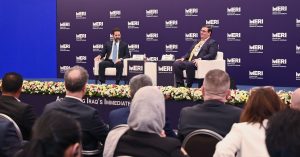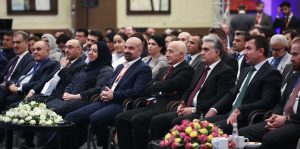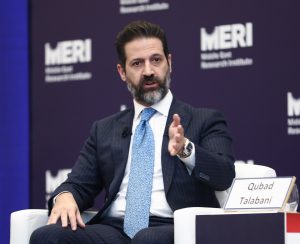Decentralization or Re-centralization: That’s the Question
This policy debate examined the mode of governance in Iraq, zeroing in on the ideal scenario that could suit Iraq in light of its constitutionally stated federal nature and the diversities it enjoins. In doing so, Andrea Nasi, The Austrian Ambassador in Iraq conversed with Qubad Talabani, Deputy Prime Minister of the Kurdistan Regional Government (KRG) and a long-serving politician actively engaged in negotiations with Baghdad about power and revenue sharing.
The discussion was initiated with an exploration of the potential advantages associated with the establishment of a Federal Council in Iraq. Although mandated by the Iraqi Constitution, the formation of this Council has not materialized to date. Emphasizing its significance in preserving a balanced distribution of power within the governing framework, particularly shielding minorities from marginalization by the predominant forces, Talabani asserted that the Council was conceptualized to “create checks and balances in the system.” Such a mechanism “can serve as a safeguard against the potential misrule of the majority, thereby promoting adherence to the rule of law and principles of equality.”
Qubad Talabani underscored the broader impact of this proposed body, suggesting that its establishment would ensure active participation of provinces and federal units in the governance process. This, he contended, would not only contribute to the fortification of the federal system but also enhance public ownership and engagement. In essence, an elected and equally represented Federal Council is envisioned as a mechanism to uphold democratic principles, prevent potential abuses of power, and bolster the inclusivity of governance in Iraq.

The Iraqi constitution of 2005 outlines Iraq as a federal entity, presenting overarching guiding principles to establish a federal system. However, over two decades later, the specific translation of these constitutional provisions into the practicalities of governance, particularly in delineating the relationships between the central government and the regions and provinces, remains elusive. Iraq still exhibits a high degree of centralization, with unregulated interactions with the Kurdistan Region of Iraq (KRI), the country’s sole federal entity. This lack of regulation results in the KRI oscillating between acting as a federal entity and operating independently, mirroring the broader fluctuations within the Iraqi state itself, which alternates between decentralizing and concentrating authorities based on political expediency.
The panel suggests that this state of confusion stems from the failure to transform the constitutional framework into specific regulations that define the distribution of authorities among the various administrative units within the country. The absence of such regulations has led to a situation where the KRI and the Iraqi state operate ambiguously, contributing to the observed inconsistencies and fluctuations.
According to the Deputy Prime Minister, centralization is a functional model only in the context of dictatorship which would starkly contradict the aspirations of both the international community and the Iraqi people, both of whom made significant sacrifices to replace a dictatorial system with one characterized by equitable governance. The panel emphasized the need for Iraq to move beyond the existing constitutional framework, advocating for specific regulations that articulate the distribution of powers among different administrative units as a necessary step for effective governance in the country.

Reflecting on various global models of federalism, Qubad Talabani expressed the opinion that Iraq could draw insights from existing models while emphasizing the necessity to craft a bespoke approach tailored to Iraq’s unique context. He stressed the importance of safeguarding the country’s idiosyncrasies, advocating for a model that not only accommodates diversity but also solidifies citizenship through robust representation, active participation, and a precise definition of rights and responsibilities. In this regard, he highlighted the need for the KRI to align its constitution with these principles, noting that the current governance in the KRI combines elements of both centralized and decentralized systems, leading to inherent contradictions.
The existing structural ambiguities, for instance that of the roles and responsibilities of governors, point to a broader issue of lacking clarity in delineating authorities across administrative levels in the KRI. Talabani argued that what is currently missing in the KRI is a well-defined distribution of powers at all administrative levels. Despite calls for federal decentralization from Baghdad, he asserted that what Kurdistan truly requires is genuine decentralization to address the existing contradictions and enhance the effectiveness of its governance system. This, he pointed, could be achieved if the KRI has a clear implementable constitution.

Relegating power can naturally be difficult for powerholders. It can lead to the formulation of mechanisms that could hold authorities in check and grant agency and voice to individuals and groups outside the structures of power. The ruling powers might therefore, be reluctant to decentralize power while those that fall outside the realm of real power in Iraq are calling for a decentralized system of governance, giving rise to a tension that is likely to be addressed in the short run. What is hopeful, according to Talabani, is that federalism is now a requirement that goes beyond the wants of Kurds. It is a system of governance that is no longer “a Kurdish demand”. It is advocated for across Iraq and across its ethnoreligious.
MERI Forum 2023
Addressing Iraq’s Immediate Priorities
10 & 11 October, 2023
Session 12: Decentralisation or Re-centralisation: That is the Question
Session Video

